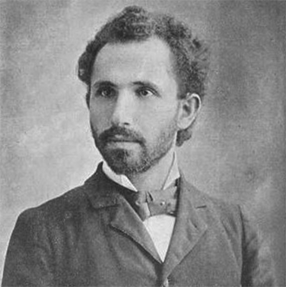translated by Rose Pastor Stokes and Helena Frank
Fair summer is here, glad summer is here!
O hark! ’tis to you I am singing:
The sun is all gold in a heaven of blue,
The birds in the forest are trilling for you,
The flies ’mid the grasses are winging;
The little brook babbles—its secret is sweet.
The loveliest flowers would circle your feet,—
And you to your work ever clinging! . . .
Come forth! Nature loves you. Come forth! Do not fear!
Fair summer is here, glad summer is here,
Full measure of happiness bringing.
All creatures drink deep; and they pour wine anew
In the old cup of life, and they wonder at you.
Your portion is waiting since summer began;
Then take it, oh, take it, you laboring man!
’Tis summer today; ay, summer today!
The butterflies light on the flowers.
Delightfully glistens the silvery rain.
The mountains are covered with greenness again.
And perfumed and cool are the bowers.
The sheep frisk about in the flowery vale.
The shepherd and shepherdess pause in the dale.
And these are the holiest hours! . . .
Delay not, delay not, life passes away!
’Tis summer today, sweet summer today!
Come, throttle your wheel’s grinding power! . . .
Your worktime is bitter and endless in length;
And have you not foolishly lavished your strength?
O think not the world is with bitterness rife,
But drink of the wine from the goblet of life.
O, summer is here, sweet summer is here!
I cannot forever be trilling;
I flee on the morrow. Then, you, have a care!
The crow, from the perch I am leaving, the air
With ominous cries will be filling.
O, while I am singing to you from my tree
Of love, and of life, and of joy yet to be.
Arouse you!—O why so unwilling! . . .
The heavens remain not so blue and so clear;—
Now summer is here! Come, summer is here!
Reach out for the joys that are thrilling!
For like you who fade at your wheel, day by day,
Soon all things will fade and be carried away.
Our lives are but moments; and sometimes the cost
Of a moment overlooked is eternity lost.
This poem is in the public domain. Published in Poem-a-Day on September 4, 2022, by the Academy of American Poets.
“The Nightingale to the Workman” first appeared, in the original Yiddish, in Morris Rosenfeld’s Lider-bukh (Self-published, 1897). The book was later translated into English prose in Leo Wiener’s Songs from the Ghetto (Copeland and Day, 1898), and again into English verse in Rose Pastor Stokes and Helena Frank’s Songs of Labor and Other Poems (Richard G. Badger, 1914). Stokes and Frank’s verse rendition preserves the rhyme scheme from the original Yiddish version, which is itself a variation upon a rondeau. Scholar David G. Roskies writes, in “Coney Island, USA: America in the Yiddish Literary Imagination,” from The Cambridge Companion to Jewish American Literature (Cambridge University Press, 2003), that “[b]y creating a poeticized landscape out of the sweatshop and slums, Rosenfeld introduced a species of romantic realism. By staking out the heart of urban darkness, and by creating a synthetic and modern poetic diction, Rosenfeld also heralded the emancipation of Yiddish.”

